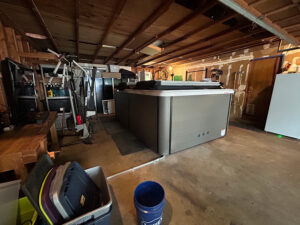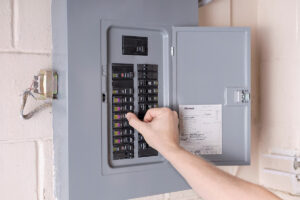Most homeowners don’t think about their electrical panel until something stops working. That’s when the big question hits: do you have a fuse box or circuit breakers – and does it matter?
The short answer: yes, it matters.
Knowing the difference between the two can help you understand how your home’s electrical system protects you, and why an upgrade might be in your best interest.
Both circuit breakers and fuses are safety devices designed to cut power when there’s an overload or short circuit. That’s where the similarities end.
A fuse is a single-use safety device made with a thin strip of metal. When the electrical current running through it gets too high, the metal melts, breaking the circuit. Once a fuse blows, it’s done. You have to replace it. That’s why you can “blow a fuse”…but you don’t “blow” a breaker…
A circuit breaker, on the other hand, is a reusable switch. It trips off when it detects too much current. You flip it back on after fixing the problem. No need to buy a replacement. This is more convenient and cost-effective in the long run.
Fuses were common in homes built before the 1960s. At the time, they did the job just fine. But today’s homes use more electricity than ever. Between HVAC systems, EV chargers, microwaves, and other large appliances, older fuse boxes simply can’t keep up. That’s why circuit breakers have become the new standard. They’re designed for higher loads and modern protection.
READ MORE: Why does my circuit breaker keeping tripping?
Another major advantage of circuit breakers is how quickly they react. They trip almost instantly when there’s a fault, reducing the risk of fire. Fuses work well, but they’re slower and sometimes unpredictable, especially if someone installs the wrong size fuse. (Yes, that happens—and yes, it’s dangerous.)
So, why haven’t all fuse boxes been replaced? Cost and awareness. Some homeowners don’t realize they still have an outdated system. Others put off the upgrade to avoid the expense. But here’s the reality: keeping a fuse box can actually cost you more over time, especially if it causes damage, limits your electrical usage, or prevents you from adding new appliances. Insurance companies also don’t love fuse panels, and some may even deny coverage if your system isn’t up to code.
So, if your home still runs on fuses, it’s time to consider an upgrade. Circuit breakers offer better protection, more convenience, and fewer headaches. And if your breaker panel is outdated, undersized, or constantly tripping? That’s a red flag too. Modern panels are designed to support today’s electrical demands safely and efficiently.
Not sure what’s behind your panel door? Call Prairie Electric. We’ll assess your system, explain your options, and help you make the safest, smartest choice for your home.


